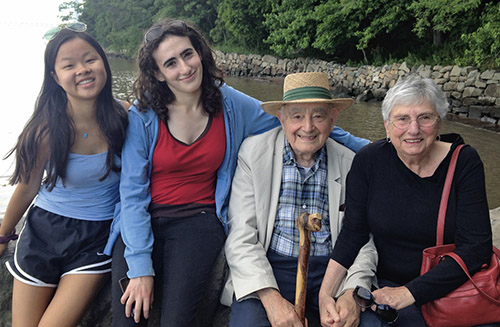
It’s always easy to tell that Father’s Day is approaching because we are inundated with electronic and paper advertisements for what are deemed the best in Father’s Day gifts. This year, these just added to the grief I have been feeling over the recent loss of my father. This is my first fatherless Father’s Day and it hurts.
It’s a holiday that I cherished in past years and, I dare say, it was fun selecting and giving him gifts as we (my family and I) celebrated our love and appreciation for my father. Indeed, I assumed that increasing sales was the impetus for the special day in the first place. But I was wrong about that. Father’s Day was first celebrated, as far as we know, in the early 1900s. The idea arose in two distinct parts of the country around the same time, having no commercial aspect. As I think about the origins of this day, I find solace in my grief.
Historical records suggest that the first official recognition of fathers was held in Monongah, West Virginia, in 1908. But the impetus for this event was a terrible tragedy that had occurred the year before. Monongah was the site of a massive mine explosion that killed hundreds of men, many of them fathers. In the aftermath of the tragedy, Grace Golden Clayton, who had lost her own father 10 years prior, asked her pastor to hold a special service to recognize and honor the fathers lost in the mine. The event was held on July 5, 1908.
Just a year later, in 1909, Sonora Smart (Dodd), from Spokane, Washington, contacted the president of the Spokane Ministerial Association, requesting the establishment of a special day to honor fathers. Her father raised his six children (she was the youngest) on his own, after her mother’s death. Sonora Smart believed that fathers, like mothers (Mother’s Day had previously been celebrated), deserved a special day. The Spokane Ministerial Association liked her idea, and their first celebration occurred in Spokane, on the third Sunday of June, a day close to Smart’s father’s birthday. Even President Wilson was there.
This event was intended to honor both living and deceased fathers. The organizers asked those honoring a living father to wear a red rose and those honoring a deceased father, a white rose.
My father was 92 when he died. I know that I am lucky because he was a loving father and I got to have him for so many years. And he was as sharp as ever until his last few days. When I talk to people about him, I emphasize his long life and I apologize for my grief, given his long life and good health. Of course, luck is always judged in a relative fashion. He was lucky (and so, my family was lucky) because most people don’t get to live that long and certainly not that well, if they do have longevity.
But I was used to having him and I miss him terribly and so I struggle with the lucky part. I know it’s true. But it eludes me because my father was the glue that held the extended family together. He was the family historian, the one who kept in touch with everyone, the one who always reached out to check in with those near and far. He was the wise elder who gave sage advice, based on his insight, intelligence, kindness and the wisdom of his years.
But I am no longer dreading Father’s Day. This year and in the years to come, I will honor my father’s memory on Father’s Day. I will wear a white rose, and celebrate his life with my family. We will look at photos and tell stories about him. I will light a candle in remembrance of him and of the other fathers who are missed this Father’s Day.
By Rena Krakow
Rena Krakow grew up in Teaneck and her mother and brother still live there. She lives with her family in the Philadelphia area and is on the faculty at Temple University.











